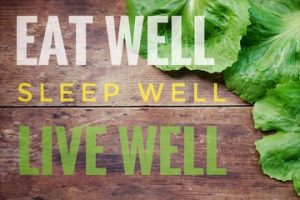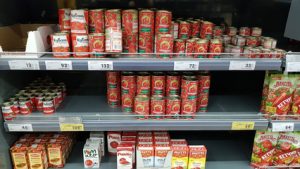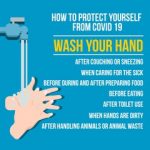
No matter who we are, the Coronavirus pandemic has caused trouble for us all. Unemployment has risen, many of us are missing friends/family, and there can be difficulties in obtaining staple food items such as pasta and flour at the local supermarket. However, there are several steps we can take to ensure that we stay positive and resilient to get through these challenging times.
How to eat well during a pandemic
A pandemic may cause some difficulty in obtaining all your normal food essentials; however, it does not have to result in unhealthy eating. It is important to try to stay strong and keep to a routine during such a confusing and distressing time. This period in your life may give you the prime opportunity to learn the value of nutrition and get innovative in the kitchen! Always aim to use up your fresh, but perishable ingredients first, to ensure food does not to go to waste. In order to do this, you need to know what fresh food has a longer shelf life. Root vegetables such as potatoes, carrots, or onions usually last well after their use by date. As always, try to consume the recommended 5-a-day, and be aware that frozen/canned varieties of fruit and vegetables can be equally as nutritious as fresh.

Ensure that you keep some easy to cook and prepare meals on standby in case of sickness. Soups and frozen ready meals are some examples.
Can diet boost immunity?
Diet cannot directly boost immunity and no specific food or supplement will prevent you catching Covid-19. However, good nutrition and hydration aids the normal function of the immune system and people who are nutritionally well cope better if they do catch Covid-19. It is important to follow a healthy balanced diet with foods from all food groups as shown in the Eat Well Guide. Micronutrients that will support immunity include copper, folate, iron, selenium, zinc, and vitamins A, B6, B12, C and D.
If you are self-isolating, especially if you have symptoms, good nutrition is essential and you need to ensure you are eating regularly even if you have a low appetite. If you feel that you are not consuming a healthy balanced diet you may want to consider a multivitamin/mineral supplement but ensure you seek advice from a dietitian or other healthcare professional on which would be most suitable for your circumstances.
Lack of time outdoors
Vitamin D works with calcium and phosphorus for healthy bones, muscles, and teeth. Most of our vitamin D comes from sunlight hence why it is often called the ‘sunshine vitamin’. Getting in some daily sunshine, as little as 15 minutes in the garden or during a short walk, or by consuming a daily supplement, will assist in boosting serum vitamin D levels. If you are self-isolating and unable to go outside, it would be highly recommended that you take a vitamin D supplement of 10mcg daily. It is difficult to obtain enough vitamin D from food sources however it can be found in eggs, oily fish, meat, offal and milk. Many breakfast cereals are also fortified with vitamin D.

Food shopping
Try and keep shopping trips to a minimum to avoid risk of too much exposure to others and ensure you follow the social distancing rules. If you are sick and/or self-isolating you can ask friends or family members for help with getting your supplies. You can also try doing online food shopping so that your supplies are delivered. Panic buying is not necessary, even for toilet roll, as the government will not close supermarkets. Currently, any product shortages are mostly due to panic buying. Kidney beans for example, are often a regularly consumed food for vegan individuals, therefore if you do not normally buy kidney beans, please do not ‘stock up’.

What can you do when essentials cannot be found?
If some essentials cannot be bought at the time you go shopping, do not worry. There are alternatives to foods such as eggs and pasta – you just have to be imaginative. For example, if you have promised the kids that you are going to bake some cookies, yet eggs cannot be obtained then look for other recipes that use different ingredients. Furthermore, pasta can be substituted for spiralised courgette. You may not currently own a spiraliser, but they are a useful kitchen utensil which can be easily ordered online, enabling meal creativity. Alternatively, you could use other starchy carbohydrate sources such as potatoes, noodles, rice or cous cous.
Time to get cooking
Staying at home will free up time to enable you to do more home cooking which is a great time to learn some new skills and try out different recipes. It will also be an opportunity to do a stock take of your kitchen cupboards and fridge and have a decluttering session and throw away any goods that have gone past their best before date. There are many websites you can go to for healthy recipes suitable for all dietary preferences including BBC good food, let’s get cooking https://letsgetcooking.org.uk/ and love food, hate waste https://www.lovefoodhatewaste.com/. You could do some batch cooking so that you can freeze some meals ready in case of sickness. It is important to follow general food safety advice such as washing your hands with antibacterial soap (which you should be doing regularly anyway) and cleaning down food preparation surfaces.

Keep to a routine
Keeping to a routine at this time regarding meals is important as it will aid in life feeling a little bit more normal. Restricting food or overindulging due to boredom could cause constipation or weight fluctuations. Mealtimes are likely something you look forward to and give you an opportunity to be creative (something your working hours may usually prevent). If you can exercise, make sure that you are keeping active daily as this will help to ensure you keep a positive frame of mind. To prevent yourself from feeling lonely and isolated ensure you keep connected with others either online/by telephone.
Further information and support
If you have any specific dietary queries, then ensure you contact a registered dietitian or other healthcare professional for further help.
Article written by Erin Wilson-Taylor and edited by Debra Williams (Registered Dietitians)